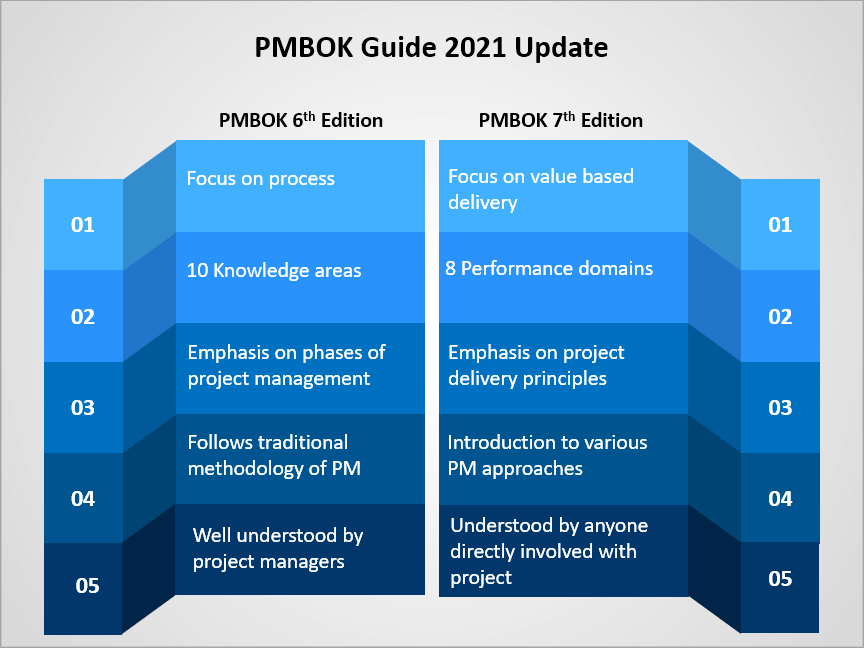The Project Management Body Of Knowledge (PMBOK) is a guide released by the Project Management Institute (PMI). The guide assists aspirants of PMP Certification with their preparation. The launch of the first PMBOK Guide was in 1994. Radical project management changes led to printing different PMBOK Guide versions. The latest guide for PMP candidates is the PMBOK Guide 7th Edition, released in 2021 (PMBOK 8th Edition is due and may release out by early 2026).
Jump ahead to
Comparison Between PMBOK 6th and 7th Edition
 PMBOK 6 Vs PMBOK 7
PMBOK 6 Vs PMBOK 7Moving from the PMBOK, 6th Edition, to the 7th Edition is a substantial change. The PMBOK 6th Edition focused primarily on processes with specific process groups and process steps. The PMBOK 7th Edition focuses on principles and has guiding principles versus processes. The ten knowledge areas became 8 project performance domains. The 7th edition has also added new sections about tailoring, and concepts of Models, Methods, and Artifacts. The 7th Edition is shorter, more reader-friendly, and adaptable to many different types of projects management efforts.
| Aspect | PMBOK 6th Edition | PMBOK 7th Edition |
| Approach | Process based | Principle based |
| Structure | 5 process groups+10 knowledge areas | 12 project management principles+8 performance domains |
| Focus | Specific processes and outputs | Outcomes and value delivery |
| Content Volume | Extensive, detailed | Concise, focused |
| Stakeholder Engagement | Part of the processes | Emphasized in principles |
| Agile and Hybrid practices | Included but less emphasized | Integrated comprehensively |
| New Sections | Not present | Tailoring: Models, Methods, and Artifacts |
Changes Seen in the PMBOK Guide 7th Edition
PMBOK guide is the foundation for individuals taking the PMP Exam. The 7th edition focuses on the system for value delivery initially released in the 6th edition. Seventh Edition of this guide shifted from being a process-oriented guide to one that was focused on principles. PMBOK is regularly updated by PMI to take into account changes and advancements in the project management industry. The goal of these revisions is to keep the PMBOK guide current and in compliance with the standards and best practices in project management.
Summary of changes:
- The process groups under the title of “The Standard for Project Management” are replaced with 12 principles of PM.
- Under the title of “A Guide to the Project Management Body of Knowledge,” the ten knowledge areas are replaced with 8 project performance domains.
- New section: Tailoring and Models, Methods, and Artifacts
How to acquire a PMBOK Guide 7th Edition?
PMBOK guide is available as a paperback and a digital copy. To access the free digital copy, an individual must be a member of PMI. The paperback is available in several bookstores both online book and offline and on Amazon.
What does the PMBOK Guide consist of?
Every PMP aspirant needs a thorough understanding of the following sections to clear the PMP Exam. These sections include Standard for Project Management and Guide to the Project Management Body of Knowledge.
Standard for Project Management covers three section introduction, System for value delivery and Project Management Principles. Also, Guide to the Project Management Body of Knowledge includes project performance domains, tailoring and models, methods, and artifacts.
Standard for Project Management
The standard to be followed, regardless of size, industry, location, and delivery methods, is described here. Stakeholders, project practitioners, and individuals accountable for the project’s progress refer to this standard for handling projects.
System for Value Delivery
This section defines how project managers can create value for organizations and stakeholders; a governance system to measure the value created; a list of operations for supporting the project; the influence of external and internal environments on the project, and the interconnection of projects, portfolios, programs, and products.
Project Management Principles
Project management principles focus on providing guidelines to project managers for managing people. Team members need to adhere to the following principles to ensure the desired results of the project delivery. They include:
Stewardship:
The goal of stewardship is to accomplish project goals while maintaining compliance, care, truthfulness, and integrity. Project stewards need to practice responsible management both inside and outside the organization. They should be diligent, considerate, and respectful to their team, suppliers, end users, customers, and other stakeholders. Additionally, they are accountable for the environment, society, and financial impacts of the project.
Team:
Members of project teams possess a variety of skills, expertise, and experiences. Project teams that collaborate may therefore achieve a common goal more quickly and effectively than those who work alone. Therefore, it is critical to foster an environment where everyone works toward the same end result. Roles and duties must be clearly defined, and the team must work together. Furthermore, a collaborative team environment promotes learning and growth for both an individual and team, alignment with other business cultures and policies, and the best possible contributions to the achievement of goals.
Stakeholders:
Stakeholders have a significant impact on the project outcome. Therefore, it is essential to proactively include stakeholders and to the extent required to support project success and customer satisfaction. Effective communication is necessary to engage a stakeholder efficiently. It also includes choosing communication strategies like “how,” “when,” and “how often”. Engaging stakeholders helps to avoid their potential negative, and increase positive impacts on the project.
Value:
The ultimate indicator of a project’s success is value. It can be accomplished at any point during the project, even after it is completed. Team members should define the purpose of the project and strive to meet a specific business requirement to add value to the project. Aligning stakeholders with the vision is necessary for the realization of value. Teams should be more concerned with the desired result than the deliverables. Furthermore, the value varies throughout various projects and businesses.
Holistic approach:
PMBOK 7 considers a project as a system made up of individuals, processes, technology, and other interconnected internal and external components. So, project managers need to handle the effects of shifting internal and external circumstances and adopt a holistic mindset. Furthermore, systems are dynamic, meaning that both internal and external factors need to be continuously monitored. Project teams should thus be attentive to system interactions so they may take advantage of favorable results.
Leadership:
Project success and favorable project results are enhanced by effective leadership. Professionals who aspire to be great leaders should foster an environment that is rich in inspiration, motivation, enthusiasm, empathy, and support. They should be aware of the variations in motivation among the members of the project team. Additionally, they should also exhibit the desired conduct in the areas of ethics, honesty, and integrity. Under this type of leadership, team members can work better and achieve the intended results.
Tailoring:
Every project is distinct from another. Therefore, the project team should use a “just enough” method to maximize value, manage cost, and enhance speed while designing the project development strategy, taking into account the project’s context, objectives, stakeholders, governance, and environment. Tailoring projects can increase a company’s ability for creativity, effectiveness, and productivity and to adjust to changing project conditions.
Quality:
Project managers should continue to prioritize quality to generate deliverables that satisfy project goals and comply with the needs, uses, and acceptance standards specified by relevant stakeholders. Ensuring that project processes are acceptable and as effective as feasible is part of project quality. Quality should taken into account at every stage of the project. Team can evaluate deliverable’s quality by auditing and inspection. Moreover, they can use reviews and audits to confirm the quality assurance process.
Complexity:
The quantity of risks, occurrences, circumstances, and stakeholders makes certain projects more complicated than others. Complexity is a characteristic of a project that can be impacted by system behavior, human behavior, or the ambiguity and unpredictability of technological advancement. Therefore, the project team should have adaptability skills and be open to adopting novel ideas to handle complexity. They need to recognize the components of complexity and apply a range of techniques to lessen its influence or amount.
Risk:
Every project has both opportunities and risks, which can be positive or negative. Therefore, project managers should continuously address risk during the project. They need to assess risk exposure, including threats and opportunities, to limit adverse impacts and maximize positive effects on the project results. They should be able to provide responses that are appropriate for the risk’s significance, economical, approved by the relevant stakeholders, and owned by a responsible person.
Adaptability and resilience:
Project managers should be able to adapt and respond to change if they want to enhance their projects. So project team should include adaptation and resilience in their methods to facilitate change, overcome challenges, and progress the project’s objectives. It should also involve both external and internal changes. Therefore, project managers and their teams should learn to adjust to the new changes.
Change Management:
There are two possible sources of change in a project: internal and external. It might be difficult to allow change in a project since it requires some flexibility and getting to know people both inside and outside the team. The project manager is responsible for making sure the right change management strategies are applied. They should include stakeholders and encourage them to embrace change to ensure success.
Guide to the Project Management Body of Knowledge
This part describes the link between the project management standard and the PMBOK guide.
Project Performance Domains
The domains mentioned here establish an integrated system for delivering projects with the desired outcomes.
- Stakeholder: PMP aspirants learn to perform stakeholder analysis to maintain a healthy relationship.
- Team: Activities related to managing people who produce results while initiating interpersonal skills come under this domain.
- Development approach and lifecycle: Tasks that assist in developing products or services following the project lifecycle are described under this element.
- Planning: This domain lists the plan for organizing and collaborating on activities necessary to deliver the results.
- Project work: Procedures, acquiring resources, and creating a learning environment for the project team come under this domain.
- Delivery: Tasks related to the delivery of scope and quality that the project intends to achieve on completion are listed here.
- Measurement: Evaluation and control measure tasks for maintaining a standard level of performance are described here.
- Uncertainty: Activities associated with risks and uncertainties arising from the project are listed under this element.
Tailoring
This part is the new section in the PMBOK guide. It assists project management professionals (PMP) in making changes in the procedures followed for project management. This, in turn, helps tailor PM practices per project and organization needs. Tailoring can be applied to different elements of project management, such as project lifecycle, processes, stakeholder relations, models, and artifacts. This benefits the organization and project managers in many ways.
Models, Methods, and Artifacts
PMP aspirants should master the commonly used methods, models, and artifacts for managing projects. It enables the project team to select the best tools from the many options available. This helps in setting strategies and achieving desired outcomes.
Principles of Project Management
The PMBOK 7th edition highlights 12 guidance principles aimed to support the project team and project manager with achieving value and success. The twelve principles are:
- Be a responsible, respectful, and caring steward.
- Create a cooperative project team environment.
- Relate to stakeholders promptly.
- Focus on value.
- Identify, assess, and respond to system interactions.
- Exhibit leadership behaviors.
- Tailor based on circumstance.
- Build quality into processes and deliverables.
- Manage complexity.
- Optimize risk responses.
- Foster adaptability and resiliency.
- Enable change to achieve the desired future state.
These principles represent a conceptual shift away from process-based content into a mindset of outcomes, values, collaboration, and flexibility, in line with the dynamic contemporary project management environment.
PMBOK 8th Edition – It’s Comparision with PMBOK 7th Edition
The expected release PMBOK 8th Edition, due out by early 2026, is based on the 7th Edition’s principle-based framework. It reinstates some structure to address user feedback. There have been statements about a reduced number of principles from 12 to 6 for easier memorization and practicality. There’s a shift back to a more process approach, with around 40 processes, aligned with seven updated but similar performance domain changes, and a traditional process-oriented approach. There seems to be more input on directives regarding new technologies like artificial intelligence, and some updates, including hybrid and agile methodologies and performances. The 8th edition is meant to have an even greater balance of principles; actionable tools and methods, while adapting to more change a value-oriented approach than in the 7th Edition.
Implementation and Expectations for the PMBOK 8th Edition
The PMBOK Guide 8th Edition will be released in early 2026, with the Kindle version approximately in November 2025 and the paperback in January 2026. The goal of the 8th Edition is to respond to requests from practitioners for a more practical and usable guide while maintaining the value-centric thinking introduced in the 7th Edition. Additionally, one of the major advancements will be a streamlined set of principles, going from 12 principles to 6 strong principles. This will make for clearer and more practical guidance for project managers. In the 8th Edition, you will again see a structural approach to processes. This aligns more with traditional process groups, while also exposing approximately 40 processes. It will provide practitioners with the opportunity to engage best practices in their environments, regardless of the type of project. The latest of the PMBOK Guide will also add to the discussion of AI, procurement, and project management offices (PMOs) with several new appendices. This shows PMI’s dedication to preparing professionals for professional organizations moving toward a digital-first world. The guide will also bring to light the prevalence and recognition of hybrid methodologies to continue supporting the diversity of project management today. Overall, the 8th Edition attempts to bring together the strengths of a principle-based mindfulness and a method of action-oriented process.
| Aspect | PMBOK 7th Edition | PMBOK 8th Edition |
| Number of principles | 12 principles | 6 core principles |
| Approach | Principle-based, flexible framework | Hybrid principles+process driven |
| Performance domains | 8 domains | 7 updated domains |
| Process guidance | Minimal, non-prescriptive | Re-introduction of about 40 processes organized as before |
| Technology focus | Emerging technologies mentioned | Strong inclusion of AI and technological impact |
| Content focus | Value delivery, adaptability | Value delivery, actionable practices |
| Methodology guidance | Comprehensive agile and hybrid inclusion | Enhanced agile and hybrid focus |
Summary
The PMBOK Guide has gone through an evolution from the 6th edition to the 7th edition and is soon to be the 8th. The PMBOK Guide 6th Edition was very prescriptive in its approach, looking at processes and knowledge areas. The PMBOK Guide 7th Edition took a step back and introduced a principles-based approach, with an emphasis on delivering value and adapting project delivery. The 7th Edition emphasized 12 principles and included 8 performance domains as opposed to strict processes so that the PMBOK applied to more generalized project delivery types.
Moving into the 8th edition, the PMBOK continues as it emphasizes the adaptability of processes, the restrictive nature of previously outlined prescriptive processes, and makes use of digital and AI capabilities. It has noted an emphasis on sustainability, a focus on data-driven decisions, and a focus on hybrid methodologies. All of these developments have had an impact on how the PMBOK has evolved to the way project management frameworks are organized over the past 50 years. Consistent with the mission of a PMBOK Project Management Framework, it has transitioned from an organizational structure of process to flexibility around outcome across project types, not limited to construction, from where it sprung. It will benefit the future of project management in modern workspace. It helps them recognize the changes as they pursue and prepare for their future certification exams.
Conclusion
With the help of the PMBOK Guide, PMP aspirants gain a clear understanding of the latest practices, tools, and techniques. Professionals can effectively manage their project-related tasks with this knowledge. PMBOK Guide helps speed up acquiring the gold standard of Project Management Institute’s Project Management Professional (PMI-PMP) Certification. Aspirants can undergo PMP Certification Training course to gain knowledge of the changes mentioned in the exam outline. This helps individuals to gain a comprehensive understanding of 12 principles and eight domains. With the expertise of highly qualified trainers in project management, candidates can clear PMP exam easily.
FAQs on PMBOK Guide ( PMBOK 7th and PMBOK 8th Guide)
1. What is the PMBOK Guide 7th Edition?
The PMBOK Guide 7th Edition is an updated resource issued by the Project Management Institute in 2021. It presents the most modern standards, principles, and domains for project management across sectors. This edition adopts a principle-oriented approach, emphasizing project value and outcomes instead of mandatory processes.
2. What distinguishes the 6th and 7th Edition?
The 7th Edition discards the strict hierarchy of process groups and knowledge areas, replacing them with twelve principles and eight domains of project performance. It promotes and supports the quick delivery of value based on the outcome rather than the step-by-step process.
3. What are the twelve principles introduced in the PMBOK Guide 7th Edition?
These principles direct project managers to get a good ‘stewardship,’ co-operate with the team, ‘engage’ the stakeholders, ‘focus on value,’ think ‘holistically,’ be ‘leaders,’ ‘tailor,’ do ‘quality oversight,’ manage ‘complexity,’ be the best in ‘risk response,’ be ‘adaptable,’ and ‘enable change.’
4. Why was the PMBOK Guide revised to focus on principles rather than processes?
Project management has matured to a level where projects of all kinds have one common denominator – flexibility. Hence the movement to apply principles that mainly focus on the project’s outcome, as well as the client’s value and collaboration, in rolling out the change. The switch was aimed at being more widely applicable and relevant to practitioners.
5. What are project performance domains in the 7th Edition?
Project performance domains are eight essential areas that combine the systems required for successful project delivery, such as the team, stakeholder, planning, project work, delivery, measurement, uncertainty, and development approach and lifecycle.
6. How does the concept of tailoring improve project management?
Tailoring gives the power to the managers to establish the most suitable strategies for that particular project’s aims, context, and environment. This will result in the most effective use of the resources and also be in line with the organization’s needs.
7. What role does the agile and hybrid methodologies play in the PMBOK Guide 7th Edition?
The agile and hybrid methods are completely integrated and advocated. Thereby showing the flexible practices for evolving project environments, and also the broadening of the guide’s usability beyond merely the traditional management practices.
8. How can professionals access the PMBOK Guide 7th Edition?
Anyone can purchase a physical copy from major retailers or online platforms, while PMI members may download a free digital edition from the official Project Management Institute website.
9. What updates are expected in the PMBOK Guide 8th Edition?
The upcoming 8th Edition focuses on simplifying principles, reducing them to six, and reinstating around forty process guidelines. Additionally, adding content on AI, procurement, and hybrid methodologies. Its release aims to balance value-centricity with practical, actionable guidance.
10. How does the PMBOK Guide help in preparing for the PMP Exam?
The PMBOK Guide serves as the foundational reference for current exam content, outlining critical concepts, principles, and practices required for successful project management.



